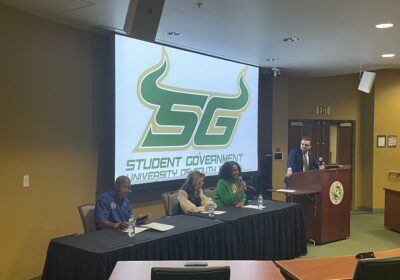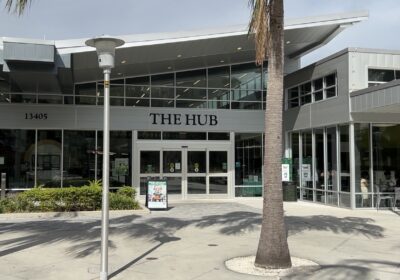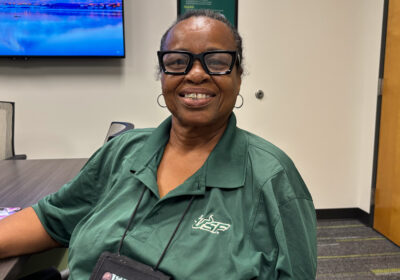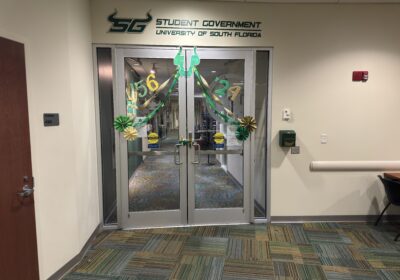Faculty overcome challenges posed by online teaching during pandemic
Associate professor of photography Wendy Babcox had both her personal and professional lives turned upside down in a matter of months after her mother was diagnosed with cancer and USF classes moved online at the end of the spring 2020 semester.
When campus closed down in March of last year, faculty had the week of spring break to transition their classes to an entirely remote environment. Just like Babcox, many had to quickly adapt to teaching via videoconferencing platforms like Microsoft Teams and Blackboard Collaborate while also adjusting to a heavily homebound life during a pandemic.
“I developed a fully asynchronous photography class, which I taught for the first time in the summer,” Babcox said.
“Lots of things were happening at once. My mom was ill, there was a pandemic [while] working on these online classes. I actually flew … back to England to look after my mother. While I was there caring for her, I was first developing the class and then teaching the class. So, that was complicated and difficult.”
In the past year, USF professors have settled into these circumstances as best they can, but some can’t help but miss being on campus and interacting with their students face to face.
Michael Bowen, professor of strategic management at the Muma College of Business, was certified as an online instructor before COVID-19 hit. He said his prior experience teaching online courses allowed him to transition smoothly to remote instruction, although it’s still not the ideal situation to teach in.
“It’s not as good or as satisfying,” Bowen said. “From my point of view, I can’t go and sit down with a group of students in the middle of a session and just talk with them at any time. Now, it has to be formal meetings, and it’s all virtual, and you’re not really looking at anybody because typically it’s all just audio and [students] choose not to [turn on their] video, for whatever reasons they might have.”
One of the most disappointing things about teaching virtually for Bowen is not getting to know his students and not being able to recognize them individually as he was used to.
“[When] the students really get it to where you see in talking to them that they really understand something, and then you watch them take off from there, that’s the fun part [of] the profession for me,” he said. “And you really see that happens quite clearly, it gets quite fun.”
This past year, many professors like Babcox have been working twice as hard because at times it can take longer to prepare online lectures. She said an explanation of a concept in her photography class that would take 14 minutes in the classroom now takes her almost 12 hours to record for a video lecture.
“I would say that most professors are working harder than ever,” Babcox said. “I don’t know if we are all being as flexible with ourselves, because we feel this need to do our best.”
Taking an occasional break from her responsibilities has allowed Babcox to clear her mind and adapt to the new reality many teachers now face.
“There are things that I try and keep in my day, like exercise, mindfulness, eating properly, small things, like taking five minutes to sit outside in the sun,” she said. “Just those things that keep your endorphins moving.”
Distractions during class times and some technical mishaps have become common for professors as well. Some have to help their own children with online schooling, others have to deal with noises from their neighbors, and in the case of professor Kendra Daly from the College of Marine Science, she has to deal with interruptions from her new kitten, Finn.
“I got a new kitten just before Christmas, and he’s very active,” Daly said. “So sometimes I just have to get up and put [him] in the bathroom while I am in class. And it’s been kind of fun being in meetings and watching people’s pets and kids go by, and you get to know a little bit more about people or home life.”
Professor and undergraduate adviser at the College of Engineering Scott Campbell has faced similar issues with his furry friends as well as maintenance around the house causing disruptions during his classes.
“The cat will jump up on the desk at random times, and the dog will bark sometimes. … Every once in a while we have a plumber in and he can only come at a particular time, and it happens to be while I am teaching so I’ve got to ask them to be quiet,” he said.
However, he said the extended time at home has been beneficial overall for him and his family.
“But beyond that level, there’s no major challenges,” Campbell said. “My wife claims to be happy to have me around more. [I] get to see her more. That’s a nice thing.”
Campbell said even though he enjoys working from home, he recognizes students thrive more with in-person instruction.
“As I said, it works great for me, but I don’t think it’s the best experience for the students,” Campbell said.
Faculty members expect most people will be vaccinated by fall and face-to-face instruction will resume. Although USF administration has yet to announce the resumption of fully in-person instruction, the faculty hope to have a normal semester again.
“What keeps me going, as a professor, for the [40] years that I’ve been doing this, … is you see all of a sudden the light bulb goes off in the kids’ heads, and that’s really gratifying when you’ve given them an experience where they got it, and all of a sudden you can’t stop them,” Bowen said. “So I’m looking forward to that.”






